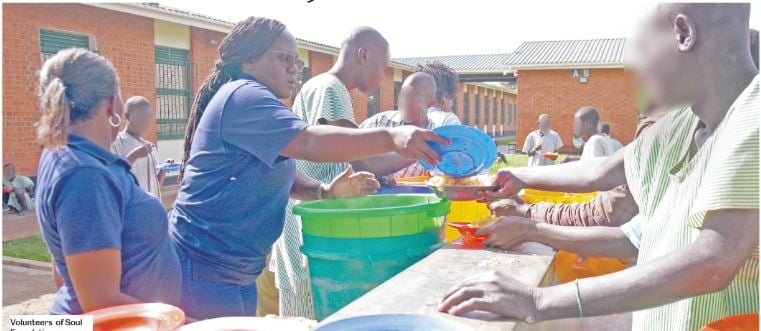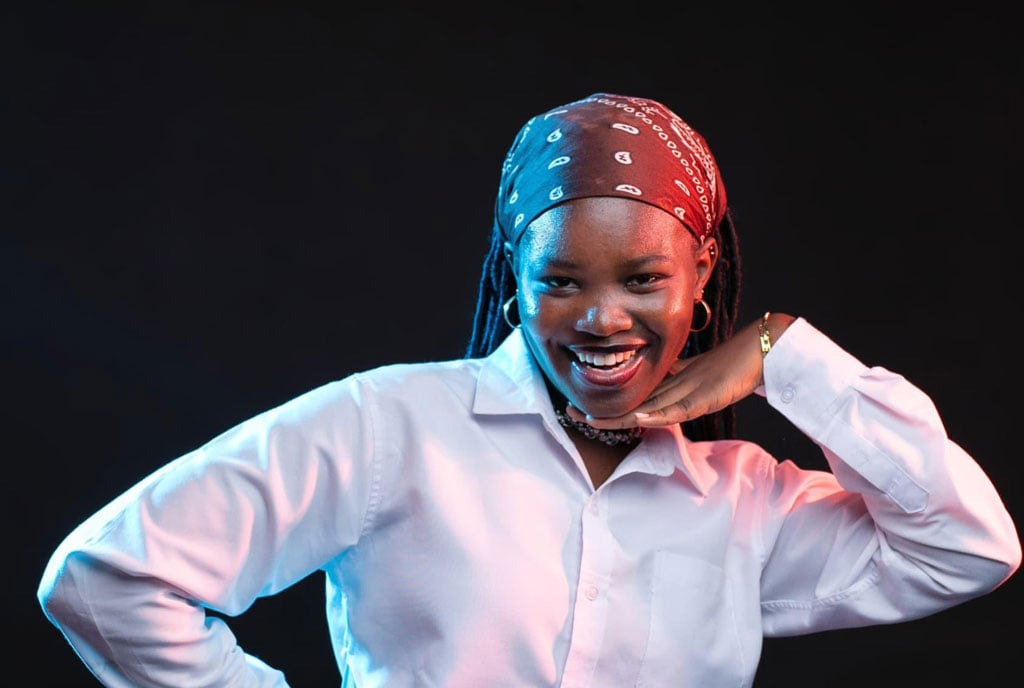At Butabika, Christmas came a little early

Volunteers of Soul Foundation serve a buffet to patients. PHOTOS | MICHAEL KAKUMIRIZI
What you need to know:
- Philanthropy. Geraldine Opoka is famous for her zumba dance sessions, but she is also passionate about mental health. She recently gave an early Christmas gift to Butabika Hospital, writes Abdul-Nasser Ssemugabi.
As the old pickup faced the gate to the women’s convalescent ward, a woman spread her hands, bending her head a bit rightward, her straight hair touching her shoulders and said: “Thank you for feeding us...God bless you.”
She flashed a smile.
“Thank you very much,” others joined in unison.
It was 3pm, two hours past their usual lunchtime. More so, this delayed lunch was unlike the usual posho and beans. It was a special, mini-buffet: pilau, chapatti, matooke, beef stew, vegetables. A drink would follow later.
“What of us who don’t eat meat?” a member of staff in a purple dress asked.
“Let me check in the kitchen,” said a man, dashing to the pickup truck. Three more wards were due to be served. They were the priority now.
The fried chicken would later come, finger-lickin, straight from Colonel Sanders’ kitchen.
The delight is no different at the Female Ward, where the service started. Or at Kirinya A, B, and C, plus UPDF—four wards accessed by one gate, separated by fences and mini-gates.
The inmates never stop thanking the food crew. Some are so swift they come for the second turn before others get the first, but the staff are strict enough to ensure they behave.
“Mwebale kutuleetera ku katogo,” said a thin aging man, with foam over his white beard, as the food vehicle approached Biina, the most populated ward. The residents wore shorts and shirts with pale blue and white stripes.
“Ndowooza ekyeggulo kya ssaawa ssatu…,” (I hope supper will be served at 9pm), said one man sternly, disappointed by the delayed lunch.

Some of the volunteers chop onions in the kitchen at Butabika hospital.
Another man, probably in his early 30s, stood firm in the queue, eyes straight into one of the food crew and said: “Thank you for this food, hope even supper will be as good.”
A member of the food team told him: “Thank God and ask Him for more; He may do more miracles.”
Make it happen
As the food crew pulled outside the gate, two inmates asked for some unripe mangoes from the tree outside the wire fence. It could be their salad. It could be their meal.
The old man looked eager and hungry but the truck left while he was still staring at it, instead of rushing to the serving point.
Dr David Basangwa, Butabika’s former executive director, and now Soul Foundation patron, lauded Geraldine Opoka’s passion for mental health. But she needs partners to feed more than 1,000 inmates and staff. She is serious, believable and with an infectious smile that instantly makes friends.
“There’s nothing we do here that we spend even Shs100 of our money on,” said Opoka, founder Soul Foundation.
“Everything here is done by wonderful partners.”
Opoka is a corporate woman more famous for her zumba dance sessions which have since 2014, helped several middle-aged women love themselves, “feel sexy, beautiful, again.”
In 2017, she took her dance to Butabika staff and patients.
“It was the best experience,” she said, beaming with a smile.
Soul Foundation was born, and Opoka became family at Butabika. Limited funding and Covid-19 disrupted but never killed the relationship.
Last year, the foundation held its first Christmas party in Butabika. But some partners felt 12 months was too long to give again to a community so much in need.
They ensured that every week of 2022, Opoka delivers pineapples, mangoes, cabbage, silverfish, soya, rice porridge to Butabika. They are Lot2545, a charity, whose dream is a Uganda where every child is loved and valued by his family in a self-sustaining household.
Like they did last year, Mandela Millers provided wheat flour; Yokuku gave chicken last year and this year KFC spiced up in a partnership. Capital Shoppers offered cash; Coca Cola provided the drinks.
Fitness Junction Gym offered the staff Shs2.4m plus an oven for the outpatient department. Liberty Insurance offered gifts for staff; Quality Supermarket offered shopping vouchers.
The Women’s Getaway donated 205 pairs of plastic shoes to the inmates.
Opoka thanked St Paul’s Church of Uganda, Buziga and St Luke’s Chapel, Butabika for feeding the souls. And the hospital administration for “allowing us to bring the outside to Butabika and taking Butabika to the outside.”
Hands on deck
Established in 1955, about 12km East of Kampala, Butabika is the second biggest hospital in Uganda with a bed capacity of 550, though the number of patients ranges between 850-1000. The only national referral mental health hospital in the country also handles about 350 clients per day at the outpatient department in general and mental healthcare areas.
Butabika provides general and specialised mental health treatment; it is a platform for research into mental health trends and a training institution for several mental health specialists, from nursing to post– graduate students.
Yet the general view of Butabika, its residents and mental health, in general, is largely negative.
By attracting friends and whoever, into such events, Opoka is silently normalising talk about mental health and changing mind-sets.
In the conversations inside the hospital’s vast kitchen where most of the meals were made. An inmate pushed a wheelbarrow into the kitchen. Using a spade, he cleared the heap of potato peels. The eyes that first greeted him with anxiety were no more.
“Some are really very peaceful,” one volunteer said. “…and they can be productive,” said another.
But a clergyman ensured the talk isn’t about mental health. He always moderated it around relationships and marriage. His dark glasses above his eyes, black short-sleeved collarino, and grey trousers, he carefully wrapped his sensitive submissions in layers of humour.
With a thinning hairline, white O-shaped beard, the women called him just Reverend.
Mujja kuvaawo mukkirizza babawase, (By the time you leave here, you’ll have accepted to get married), Zahara, one of the volunteers told colleagues who were whining about how men are no longer men.
‘How old do you think my first-born is?’ Reverend, tested them.
“28, 30, 18,” they guessed. All wrong. He is 10.
Reverend married at 47, his wife at 39. “And we have lovely children.”
‘What were you waiting for?’ One quipped.
“The beautiful ones were not yet born,” Reverend answered, to the amusement of all.
He says there is no limit to when one can marry.
“Oh! Biologically, there’s,” a quietly spoken young woman, retorted.
“Haven’t you seen women giving birth above 50?” Reverend countered.
“But at what cost?” she insisted.
You choose who to believe. But it keeps the volunteers going.
Opoka and her corporate partners; some are mothers, brought their teenage sons and daughters to engage in this mindset-change outing.
They chopped onions, salads, and rushed to their cars to nurse their babies, just a few weeks old.
There was Hilda, the hands-on supervisor, who never rested until everyone had a plate full of food.
Then, Gonahasa, the restaurateur who cooked the classic pilau and stayed all day. His relatives are patients here. He knows what it means.
Then there was Cathy, Esther, Barbara, Jamila, Awuyo, among other staff who did a great job in the kitchen.
Everyone can’t wait
The wards are mostly silent. But some random, uncoordinated noise escaped from the fences. Some patients leave the wards and wander in the vast fresh green lawn. It is 1pm, lunchtime.
But the catering team is not ready yet. A patient in a green suit stands still as one man performs swalla in the backyard.
The others had asked for chapati. The man gives him one. “Woggye azzeewo,” (God reward you for this), he said, his smile betraying his missing upper teeth. Another in a striped suit, lurked around the kitchen. He too got a piece of chapati.
But the other, who sat with his pink plastic plate, near the pilau vessels was told to wait inside the ward. He just retreated, tapped water on his plate, drank, and stayed around.
It was approaching 3pm. Most food containers were heading to the wards. Opoka could not rest until enough was taken to the gardens, where the staff party would soon start. To her, staff is as dear as patients.
The Muyenga you didn’t know
At Kireka ward, the man who pulled the food vessel into the ward wore the green suit, but a fresh crew cut and trimmed and shaped thick beard on his fleshy cheeks made him look like the odd man out. Yet he belongs here until his woes ease. It is not as simple as said.
Just behind Biina is Muyenga Ward. A man sat in the doorway, his head nearly touching the floor, as if he was stretching.
But he was motionless, under the raging sun, his bones nearly tearing through his skin. Is he alive? One wondered. Not even the noise welcoming the food moved him. His mates did not bother either. Maybe, they too have a lot to deal with.
Some are physically crippled others too disconnected to hide their privacy. They move like babies.
This is the ward for the very sick. This cannot be Muyenga, the posh suburb.
Yet these are our sons and daughters, brothers and sisters, mothers and fathers, relatives, friends, workmates, and celebrities. We once loved them. We now loathe them.
Opoka wants us to love them again, like that young man who regularly spends hours visiting his brother at the alcohol and drug unit. Or that father who walked his son into the facility in the morning for treatment.
“It makes them better, with God’s grace.”
Just when the food crew was pulling out of the ward, the bending man rose. He is still alive.
Thank you
Angelah Ilakut, Butabika’s acting assistant commissioner nursing, has served here since 1987. She complained the small medical staff is overwhelmed by the patient numbers. One medic, she said, handles between 50 to 70 patients, which compromises the quality of service. Nevertheless, Ilakut commended her team for a good job.
“One of the signs of our accomplishments is this party by Geraldine to appreciate us…,” she said.
“Thanks to you who will go into the New Year with the strength to build on our accomplishments and consolidate our position…I want to assure our partners that we are determined to continue with this noble work. Thank you.”
Dr Hafsa Lukwata, assistant commissioner mental health at the Ministry of Health, wants the medics at Butabika and elsewhere to document their findings regarding treatment of mental cases, and reduce reliance on foreign-based research.
“If you have treated 100 patients, it is prudent to know how at least six have responded. Sometimes all a patient needs is love and care…and drugs alone won’t help…if that is documented it helps a great deal in future interventions.”




